Shanghai and Saving the World
In Shanghai for hit-and-run negotiations.
China is a country that wants to win and win big on a global scale, and Shanghai's iconic stores (eg. Shanghai No. 1 Department Store and Shanghai First Food Store)
make no secret of their continuing ambition. So perhaps they might have been happy to hear that they have now overtaken the USA to be named the No.1 source of industrial carbon dioxide in the world.
At lunch, after the usual business traveller talk about the airline with the cutest stewardesses, the most efficient way to collect frequent flyer miles, civil servants boycotting Singapore Airlines if flying from its home city and reviews of the best white and black truffles, we were discussing the current state and the future of China. At one point I noted that I hadn't seen a single bird since arriving in Shanghai. Had the smog killed them all? No. During the cultural revolution, all birds were culled. Were they culled because they appeared in numerous paintings and were therefore bourgeoise? No, they were bourgeoise because they'd competed with hardworking farmers for food.
By dessert, we had moved on to environmentalism, the new transnational ecumenical religion. Still mourning the absence of feathered mammals, I tried to raise the possibility of migratory birds repopulating areas designated as nature reserves in eco-cities. My mandarin being of No. 1 standard, I said,"Yeah, well, what about 那些搬家的鸟..." The entire table lapsed into shocked silence, after which someone almost put his eye out with a dessert fork, laughing.
But there is yet hope for our feathered friends in the future of this city. The great bronze sculpture that sits in the lobby of the Urban Planning Exhibition Hall features flocks of birds in frozen flight over the *iconic* 2010 skyline of Shanghai.
Museums and exhibitions, by the editing necessarily incumbent in their curatorship (argh, was that an OSF phrase?!), by their omissions and angled explanations, always give interesting insights into how a country views itself, and so, how one should relate to it. The bronze relief cast in honour to the BIE Inquiry Mission who'd help select Shanghai for World Expo 2010 might be instructive to those trying to take China to task for perceived human rights violations.
The penultimate exhibit in the hall was about the eco-city being built in Chongming on Dongtan Island at the mouth of the Yangtze River. Nothing so warms the cockles of an old tree-hugger's heart than to hear about committed sustainable developments, and to watch with mounting excitement those longheld dreams of large-scale solar and wind energy harvesting, organic farming and peaceful co-existence with nature appearing to come to fruition.*
Saving the environment is one of the few causes around which to rally the entire world. Thomas Friedman recently touted the "new green ideology" as a way to get over the "trauma and divisiveness of the Bush years". It has, he said, "the power to mobilise liberals and conservatives, evangelicals, and atheists, big business and environmentalists around an agenda that can both pull us together and propel us forward."
And true enough, everyone is getting on the messanic bandwagon to save the world and make it a better place for you and for me and the entire human race. Mother Nature has become our god and to question the premises of the eco-revolution is shocking blasphemy.
But the underlying assumptions are far too numerous:
To those who do not know God, well-meaning eco-schemes are grand and empowering. But they are ultimately naive. To those who do know God, I suppose eco-schemes present (if infact valid) a bit of temporary caretaking on the basis of Genesis 1 and 2. But ultimately, we understand that just as we have rebelled against God, so "the environment" will always refuse to co-operate with us. And we also understand that we have barely scratched the surface with our science about this intricately-constructed universe in which we live. And, in anycase, we know too that this world and its frozen mammoths and giant squids and climate change will soon pass away when Christ comes again to institute a new world. In the meanwhile, there are probably more pressing matters at hand.
*Don't suppose these improvements will be accompanied by concurrent progress in the field of little snacks like 小笼馒头/小笼包 xiaolongbaos, 饺子 dumplings and 包子 baozis.
Mega queues for the takeaway but the xiaolongbao at 南翔馒头店 (Nan Xiang Man Tou Dian) in 豫园 (Yu Yuan) was pretty rough stuff. The skin held the soup well enough but the top of the xiaolongbao, where the skin was pinched together, required quite a bit of chewing. And they don't serve Chinese tea there. All tea came in a bottle, they said.
Pork and green vegetable dumplings at 大娘水饺 (Da Niang Shui Jiao), the McDs of 饺子 (jiao zi, dumplings), tasted of drain. Good thing I chickened out on the chicken blood soup. No hot Chinese tea here either. Only overly sweet oolong in a bottle.
But because I like my bao skin slightly chewy, the bao zi at 高安路 (Gao An Lu) were great for breakfast. The thicker-than-Crystal-Jade exterior also helped keep in the sauce that accompanied the meat.
**And what's with the great firewall on biblegateway, blogger and flickr?
Shanghai Skyline at Lunchtime. No, it was not about to rain.
The 50th floor boardroom had an impressive view of the smog settled comfortably above the the bluish-grey skyline.China is a country that wants to win and win big on a global scale, and Shanghai's iconic stores (eg. Shanghai No. 1 Department Store and Shanghai First Food Store)
make no secret of their continuing ambition. So perhaps they might have been happy to hear that they have now overtaken the USA to be named the No.1 source of industrial carbon dioxide in the world.
At lunch, after the usual business traveller talk about the airline with the cutest stewardesses, the most efficient way to collect frequent flyer miles, civil servants boycotting Singapore Airlines if flying from its home city and reviews of the best white and black truffles, we were discussing the current state and the future of China. At one point I noted that I hadn't seen a single bird since arriving in Shanghai. Had the smog killed them all? No. During the cultural revolution, all birds were culled. Were they culled because they appeared in numerous paintings and were therefore bourgeoise? No, they were bourgeoise because they'd competed with hardworking farmers for food.
By dessert, we had moved on to environmentalism, the new transnational ecumenical religion. Still mourning the absence of feathered mammals, I tried to raise the possibility of migratory birds repopulating areas designated as nature reserves in eco-cities. My mandarin being of No. 1 standard, I said,"Yeah, well, what about 那些搬家的鸟..." The entire table lapsed into shocked silence, after which someone almost put his eye out with a dessert fork, laughing.
But there is yet hope for our feathered friends in the future of this city. The great bronze sculpture that sits in the lobby of the Urban Planning Exhibition Hall features flocks of birds in frozen flight over the *iconic* 2010 skyline of Shanghai.
Museums and exhibitions, by the editing necessarily incumbent in their curatorship (argh, was that an OSF phrase?!), by their omissions and angled explanations, always give interesting insights into how a country views itself, and so, how one should relate to it. The bronze relief cast in honour to the BIE Inquiry Mission who'd help select Shanghai for World Expo 2010 might be instructive to those trying to take China to task for perceived human rights violations.
The penultimate exhibit in the hall was about the eco-city being built in Chongming on Dongtan Island at the mouth of the Yangtze River. Nothing so warms the cockles of an old tree-hugger's heart than to hear about committed sustainable developments, and to watch with mounting excitement those longheld dreams of large-scale solar and wind energy harvesting, organic farming and peaceful co-existence with nature appearing to come to fruition.*
Saving the environment is one of the few causes around which to rally the entire world. Thomas Friedman recently touted the "new green ideology" as a way to get over the "trauma and divisiveness of the Bush years". It has, he said, "the power to mobilise liberals and conservatives, evangelicals, and atheists, big business and environmentalists around an agenda that can both pull us together and propel us forward."
And true enough, everyone is getting on the messanic bandwagon to save the world and make it a better place for you and for me and the entire human race. Mother Nature has become our god and to question the premises of the eco-revolution is shocking blasphemy.
But the underlying assumptions are far too numerous:
- that there is such a concept as nature or the environment;
- that the use of the rhetoric of rights as justification is correct since this rhetoric always runs into problem of the necessary prioritisation of such rights;
- that we are correct in what we think is wrong with the environment, with climate change etc;
- that what is wrong with the environment is due solely or substantially to pollution so that by controlling pollution, we can control whatever is wrong with the environment;
- that it is possible to define pollution;
- that it is possible to stop pollution without other knock-on effects...
To those who do not know God, well-meaning eco-schemes are grand and empowering. But they are ultimately naive. To those who do know God, I suppose eco-schemes present (if infact valid) a bit of temporary caretaking on the basis of Genesis 1 and 2. But ultimately, we understand that just as we have rebelled against God, so "the environment" will always refuse to co-operate with us. And we also understand that we have barely scratched the surface with our science about this intricately-constructed universe in which we live. And, in anycase, we know too that this world and its frozen mammoths and giant squids and climate change will soon pass away when Christ comes again to institute a new world. In the meanwhile, there are probably more pressing matters at hand.
*Don't suppose these improvements will be accompanied by concurrent progress in the field of little snacks like 小笼馒头/小笼包 xiaolongbaos, 饺子 dumplings and 包子 baozis.
Mega queues for the takeaway but the xiaolongbao at 南翔馒头店 (Nan Xiang Man Tou Dian) in 豫园 (Yu Yuan) was pretty rough stuff. The skin held the soup well enough but the top of the xiaolongbao, where the skin was pinched together, required quite a bit of chewing. And they don't serve Chinese tea there. All tea came in a bottle, they said.
Pork and green vegetable dumplings at 大娘水饺 (Da Niang Shui Jiao), the McDs of 饺子 (jiao zi, dumplings), tasted of drain. Good thing I chickened out on the chicken blood soup. No hot Chinese tea here either. Only overly sweet oolong in a bottle.
But because I like my bao skin slightly chewy, the bao zi at 高安路 (Gao An Lu) were great for breakfast. The thicker-than-Crystal-Jade exterior also helped keep in the sauce that accompanied the meat.
**And what's with the great firewall on biblegateway, blogger and flickr?
Labels: Travels, Travels: Shanghai, Urbanity or Just Urbanism
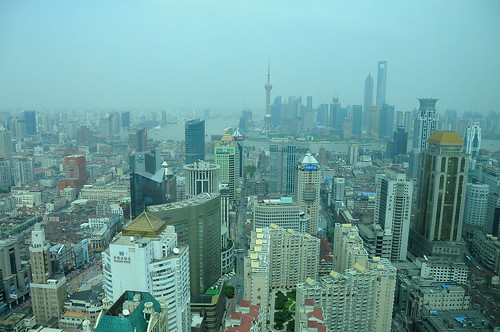
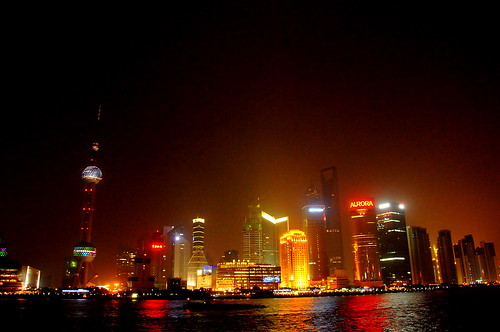
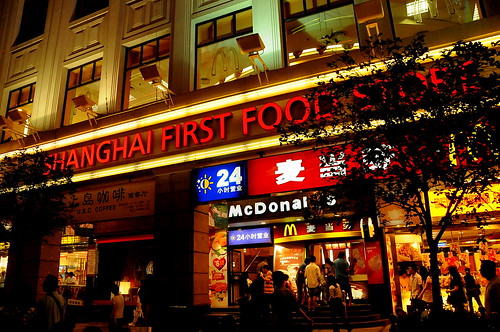
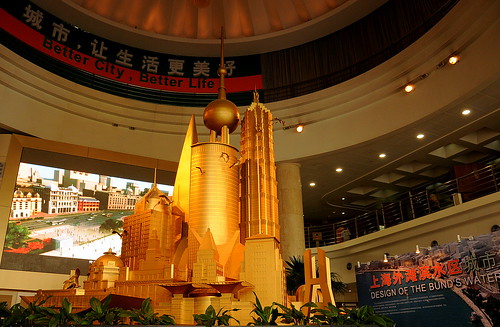
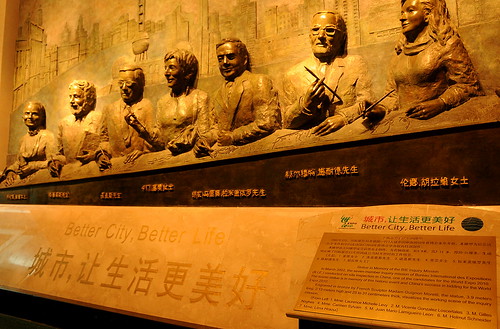
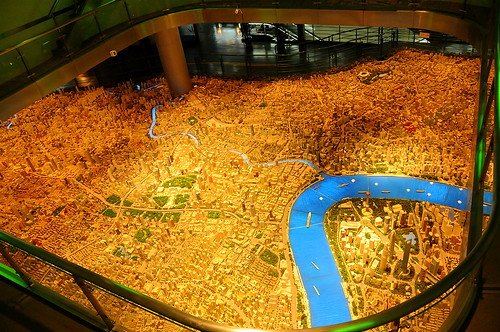
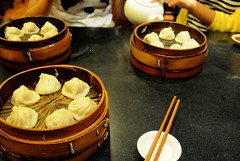
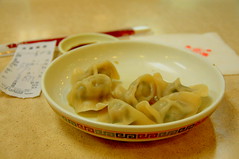
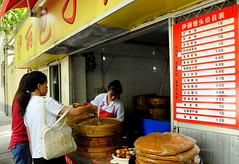







1 Comments:
Good insights on the environmental religion. The assumptions are all false, except the 1st. There is indeed such a concept as nature or the environment, and that is what has become the new idol: Mother Nature. She's been around for awhile in various guises. I hope, though, that Shanghai does do something to better steward the land, as we all need to.
Post a Comment
Subscribe to Post Comments [Atom]
<< Home